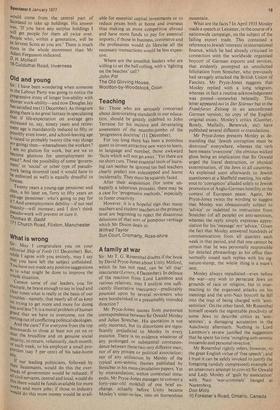A family at war Sir: M r T. G. Rosenthal doubts
if the book by David Pryce-Jones about Unity M itford, which he has not read, can be `all that' inaccurate (Letters, 4 December). In defence of the reaction from Lord Lambton and
various relatives, may 1 analyse one sufficiently illustrative inaccuracy—predictably pounced upon by several reviewers who were hoodwinked in a presumably intended direction?
Mr Pryce-Jones quotes from purported correspondence between Sir Oswald Mosley and Julius Streicher. His quotation is not only incorrect, but its distortions are significantly prejudicial to Mosley in every instance. There is no evidence whatever of any prolonged or substantial correspondence between these two very different men; nor of any private or political association; nor of any utilisation by Mosley of the typical anti-semitic themes published by Streicher in his mass-circulation papers. Yet by mistranslation, within contextual innuendo, Mr Pryce-Jones manages to convert a forty-year-old molehill of one brief exchange, actually before Unity became Mosley's sister-in-law, into an horrendous mountain.
What are the facts? In April 1935 Mosley made a speech at Leicester, in the course of a nationwide campaign, on the subject of the failing export trade. This contained a reference to Jewish 'interests' in international finance, which he had already criticised in connection with the worldwide organised boycott of German exports and services, that evidently prompted an unsolicited felicitation from Streicher, who previously had savagely attacked the British Union of Fascists. Mr Pryce-Jones suggests that Mosley replied with a long telegram, whereas in fact a routine acknowledgement was posted—somewhat belatedly. This letter appeared not in Der Stiirtner but in the Frankfurter Zeitung in an unconfirmed German version; no copy of the English original exists; Mosley's critics (Gunther, Bondy, Mullally, Benewick, etc) have published several different re-translations.
Mr Pryce-Jones presents Mosley as demanding that 'Jewish corruption must be destroyed' everywhere, whereas the verb here means 'overcome' ; the obvious wicked gloss being an implication that Sir Oswald urged the literal destruction, or physical extermination, of the Jews in all countries. As explained soon afterwards to Jewish questioners at a Sheffield meeting, his reference to 'corruption' alluded solely to Jewish promotion of Anglo-German hostility in the context of European peace. Again, Mr Pryce-Jones twists the wording to suggest that Mosley was obsequiously subject to 'advice' or indebted to instruction from Streicher (of all people) on anti-semitism, whereas the reply simply expresses appreciation for his 'message' not 'advice.' Given the fact that Mosley answered hundreds of communications from all quarters each
week in that period, and that one cannot be certain that he was personally responsible for detailed phraseology as his office then normally issued such replies with his signature-stamp, the whole thing is a mare's nest.
Mosley always repudiated—even before the war—any wish to persecute Jews on grounds of race or religion, but in over reacting to the organised attacks on his meetings and the anti-Nazi boycott he fell into the trap of being charged with 'anti semitism'. On the other hand, Mr Rosenthal himself reveals the regrettable proclivity of some Jews to describe critics as 'anti semites' ; a damaging accusation in the Auschwitz aftermath. Nothing in Lord Lambton's review justified the suggestion that he spent his time 'mingling anti-semitic innuendo and personal invective.'
Mr Rosenthal rightly refers, however, to the great English virtue of 'free speech' ; and I trust it can be safely invoked to justify the foregoing (unduly compressed) example of an unsavoury attempt to convict Sir Oswald and Lady Mosley of 'guilt by association' with Nazi 'war-criminals' hanged at Nuremberg.
Don Mills 10 Forester's Road, Ontario, Canada


































 Previous page
Previous page